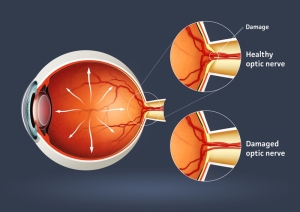Vision is a sense that many people take for granted. Although many individuals wear glasses and contacts to correct their vision or may even get LASIK, not may people consider the consequences of having a chronic disease that limits your ability to see clearly even with corrective measures. There are three specific conditions that our firm sees on a recurring basis involving vision losses: glaucoma, macular degeneration, and retinitis pigmentosa. A disability claim based upon loss of vision can be surprisingly difficult, as many insurance companies demand a high level of vision loss before being considered to be eligible for benefits. This, however, does not mean that such people are still able to perform their job. If there is strong medical evidence to back up your claims and an accurate and complete job description to show how you are no longer able to the material and substantial duties of your occupation due to these limitations, insurance companies will have little choice but to approve you for the disability benefits you deserve. Each of these conditions has different tests and treatments that will be necessary to identify and treat the disease.
Glaucoma
 Glaucoma is not a specific disease itself but is the name for a group of diseases that affect the optic nerves and can cause blindness. In fact, glaucoma is the second-leading cause of blindness worldwide. It affects 1 out of every 200 people under the age of 50 and rarely exhibits any symptoms. The two main types of glaucoma are “open-angle” and “closed-angle,” referring to the area between the iris and cornea. Closed-angle glaucoma often has a sudden, painful onset and can cause a sudden loss of vision. However, the amount of discomfort involved usually leads sufferers to pursue treatment before damage becomes permanent. Open-angle, chronic glaucoma on the other hand progresses at a slower rate and doesn’t cause the same level of discomfort. Because of this, many sufferers don’t realize they have lost vision until the disease has progressed significantly. This is the type of glaucoma that causes the most disability issues. Because of the lack of clear symptoms, many sufferers don’t realize their deteriorating condition until it’s too late to restore their eyesight, leading to permanent losses of ability.
Glaucoma is not a specific disease itself but is the name for a group of diseases that affect the optic nerves and can cause blindness. In fact, glaucoma is the second-leading cause of blindness worldwide. It affects 1 out of every 200 people under the age of 50 and rarely exhibits any symptoms. The two main types of glaucoma are “open-angle” and “closed-angle,” referring to the area between the iris and cornea. Closed-angle glaucoma often has a sudden, painful onset and can cause a sudden loss of vision. However, the amount of discomfort involved usually leads sufferers to pursue treatment before damage becomes permanent. Open-angle, chronic glaucoma on the other hand progresses at a slower rate and doesn’t cause the same level of discomfort. Because of this, many sufferers don’t realize they have lost vision until the disease has progressed significantly. This is the type of glaucoma that causes the most disability issues. Because of the lack of clear symptoms, many sufferers don’t realize their deteriorating condition until it’s too late to restore their eyesight, leading to permanent losses of ability.
Qualifying for short term disability benefits based upon a diagnosis of glaucoma is much more common than qualifying for long term disability. There are a number of effective treatments for the condition, and insurance companies often assume (and/or insist) that anyone who suffers from this condition will soon return to their former health – even though some cases of glaucoma are permanently impairing. This is why it’s so important to follow the proper medical protocols for testing and for treatment during the course of the condition. Testing for glaucoma is a part of most standard eye examinations and include measurements of the pressure in the eye, changes in the size of the eye, and examination of the optical nerve for visible damage. If glaucoma is detected early enough, it can be treated a number of different ways. There are surgical remedies, medications, medicinal eye drops, and even medical marijuana (depending on where you live) that have been proven effective in controlling and even reversing the symptoms of glaucoma. The best outcome is to successfully treat the glaucoma and recover your eyesight. But if someone suffers from glaucoma that has permanently damaged their eyesight, then it’s critical to have substantial testing and medical proof for the medical condition, its symptoms, as well as documentation tying the occupational duties to the person’s eyesight. If you’ve been accurately diagnosed with the condition, continue with proper care and treatment, and prove that you can’t perform the occupational duties, you should be able to maintain the disability benefits you deserve.
We’ll go into the other vision conditions that often result in disability claims in our next posting.
Losing your vision can be a terrifying event, and many people expect that their disability insurance company will not question their claim. But not only are many of these claims questioned – they’re denied using a variety of policy defenses. If you’re considering filing a disability claim due to your loss of vision or feel like you’re being unfairly hassled by the claims process, please visit our website to sign up for a free consultation or call our offices toll-free at (855) 828-4100.

Pingback: Bringing Your Vision-Based Disability Claim Into Focus, Part 2 | Royal Claims Advocates